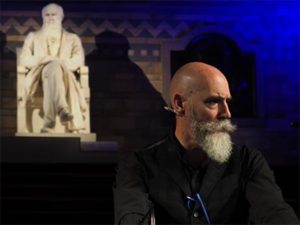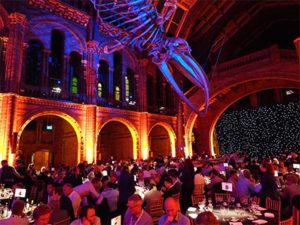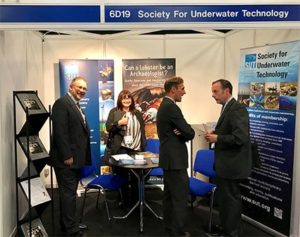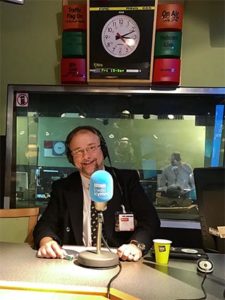Dear readers, it’s been several weeks since my last update and much has happened at the SUT. On 1st August we moved from 1 Fetter Lane to offices at Quality Court, off Chancery Lane in London. The new accommodation is suitably quirky (I’m reminded of Diagon Alley from the Harry Potter novels when approaching the place), and saves the Society over £20k per year compared with our previous home. We look forward to welcoming members who happen to be passing by but do please let one of the team know first so we can make sure you gain access, as security in London is at a heightened level after recent incidents.
Whilst on the subject of incidents I must first mention our members and friends in Houston, Texas, who weathered extraordinary storms and floods in August. Their resilience and ‘can-do’ attitude has been an example to us all as companies and individuals knuckle down to restore service as usual, and learn the lessons needed to avoid a repeat. Climate science tells us in no uncertain terms that a warmer world, especially a warming ocean, inevitably leads to an increase in the power of storms, higher average rainfall, and more frequent flooding events. These challenges are by no means restricted to developing countries, all of us must prepare for a wilder future, whilst doing what we can collectively to mitigate the factors that drive climate change. In this respect offshore gas in particularly has a valuable role to play, helping nations to transition quickly off burning coal for energy production with something like a 40% reduction in greenhouse gas emissions. Gas buys us valuable time to adapt to the new green technologies – many of which have a subsea component – that will underpin the future of many of our energy-sector member companies.
The BIG event that has tied up so much staff effort, and that of our volunteer supporters in recent months has been the OSIG Conference ‘Smarter Solutions for Future Offshore Developments’ that took place at the Royal Geographical Society 12-14th September, including an amazing conference dinner venue at the Natural History Museum. With almost 400 delegates from over 30 countries, the OSIG conference was truly a world-class event that confirmed SUT’s value as a clearing house for exchanging state-of-the-art knowledge, bringing together experts to share, discuss and enthuse about the extraordinary ocean world where our members work, research and explore. The proceedings for the Conference filled two large hardbound volumes, and will shortly go online at www.ingentaconnect.com.
The keynote Bramlette McClelland lecture was given by Alan Young, who inspired delegates with his rich knowledge and Texan delivery. Overall the feedback from attendees has been excellent, we’ve all learned a great deal and we look forward to playing our role as hosts in five years’ time. Special thanks go to Chair of the organising committee, Toby Powell of Subsea 7, and to the HQ staff who worked tirelessly to deliver the conference, especially Jacqui Adams who on joining SUT in January found herself immersed into OSIG and to Emily Boddy for her work on the published proceedings – but they’ve all done a fabulous job.
SUT had a strong presence at Offshore Europe in Aberdeen at the start of September, hosting two afternoon sessions at the ‘Decommissioning Zone’ on 6 & 7th September. Our international line-up speakers came from industry, academia, governance and even architecture, reflecting the breadth of our membership. I was honoured to act as chair of the sessions, and attended a series of networking events and dinners at Offshore Europe to help build SUT’s links with the industry. I returned to Aberdeen on 20th September to act as host for Aberdeen Branch’s ‘Question Time’ event, where an expert panel answered a variety of questions concerning the future of the oil and gas sector the changing policy, legal and financial framework, and the emerging technologies that will drive the industry in future years.
In another development that I hope will be of value to our members, I’ve been invited to join the international advisory board of the Marine Alliance for Science and Technology Scotland (MASTS) and will attend their annual science meeting in Glasgow in October, where SUT will also be conducting an offshore decommissioning workshop.
Another highlight for me was that we have just gained our 150th corporate member, appropriately enough on the 150th anniversary of the Shipping Forecast – the UK Met Office, based in Exeter. Our new friends at the Met Office are very keen to help grow SUT in the South West of England and South Wales, and I am putting them in touch with our other members in the region in anticipation of a whole new series of events, and perhaps in time the founding of a fully-fledged branch. Initially activities will be coordinated with the London and Southern England branch, who have held a number of events throughout the UK summer months, and are now settling into their autumn programme.
North East England branch continue to grow in strength and influence, and I’m looking forward to visiting them soon. Things have been quieter in our Norway, Rio, Malaysia and Singapore Branches and I have actions from Council to explore what’s happening and see what we can do at HQ to help reinvigorate activities. I’m also working with other territories to help deliver growth in SUT, and hope to have news on developments in Atlantic Canada and Africa by the time of my next newsletter.
Perth is one of our strongest Branches and continues to deliver impressive results, with a comprehensive programme of events and a very well-run admin team. I’m very much looking forward to visiting Perth in mid October where I’ll be speaking at the AUT Conference on the lessons learned from combined autonomous surface vehicle and underwater vehicle operations in the UK, and an opportunity to make my first acquaintance with our Western Australian members, students and supporters in the southern Spring weather.
In November I’m due to be at Oceanology International China in the beautiful city of Qingdao, a regular haunt in my previous job. I’ll be chairing the session on autonomy and am honoured to be supported by our very good friends at Reed Exhibitions in order to be able to be there. China Branch also have a new Chair, Professor Frank Lim, and I’m sure he is going to do an excellent job in helping to increase our membership and influence in this very important country for future SUT growth.
Also in November we will support the one day conference ‘Oceans of Knowledge’ at the prestigious surroundings of the Royal Institution in London, hosted by our friends at IMarEST. See https://sut.org/event/oceans-of-knowledge/
Finally a plug for our education activities. The Education & Training Committee met in July under the new Chair Sue John, and for the first time with international engagement via Skype and telephone. SUT will be represented at the European Marine Science Educator’s Association in Malta in November, with talks from me about using robots to explore the oceans of the moons of Jupiter and Saturn, and our publications officer Emily Boddy presenting our book ‘Can a Lobster be an Archaeologist?’ I’d encourage any members looking for Christmas presents to consider buying a copy or two for their younger relatives – contact Emily for details.
More from me in a few weeks’ time – I’m writing from the train en route to catch a plane to Houston where we’ll be launching our new Student Chapter at Rice University on Tuesday 26th September, in the company of student representatives from the existing chapters in the region. Our future as a Society depends on growing our membership base, and drawing in new income from a wider range of underwater technology users than we have in the past. The young people in the Student Chapters are a key part of that work, and I encourage all of our members to encourage, nurture and mentor the next generation.
Steve Hall, 25th September 2017 [email protected]



